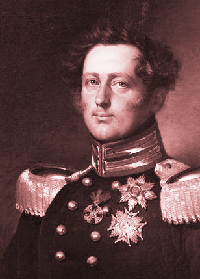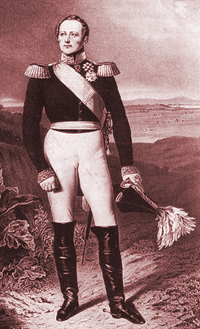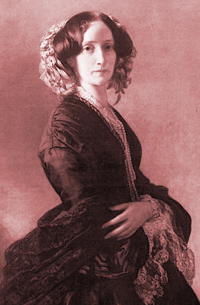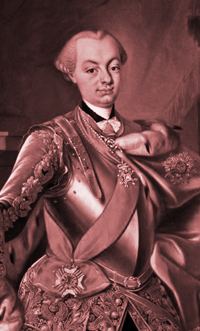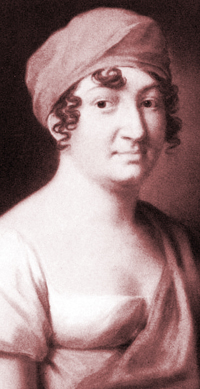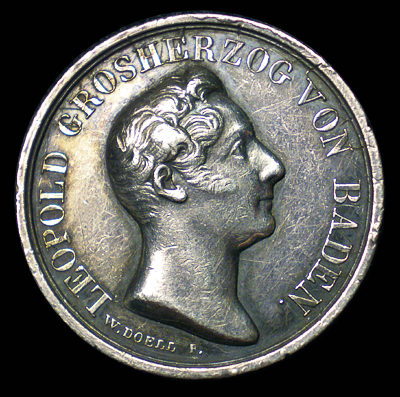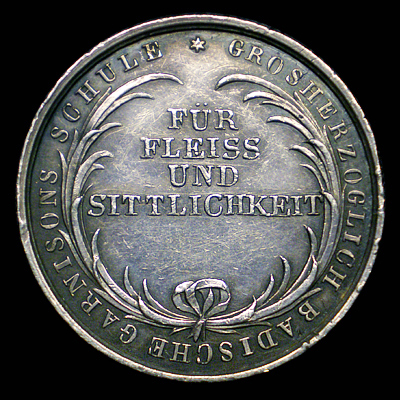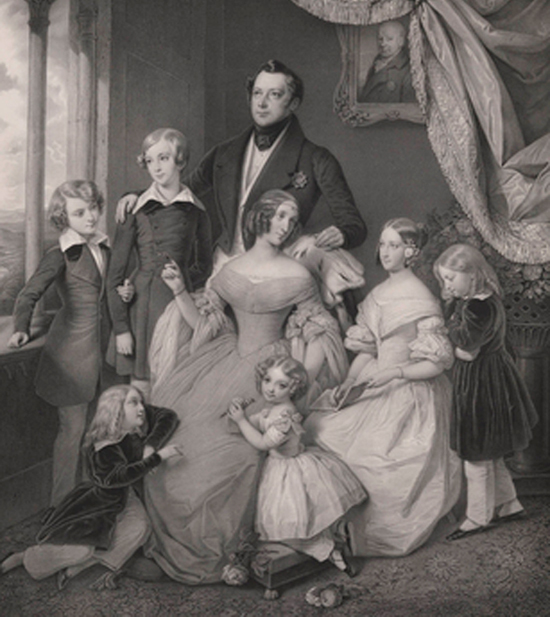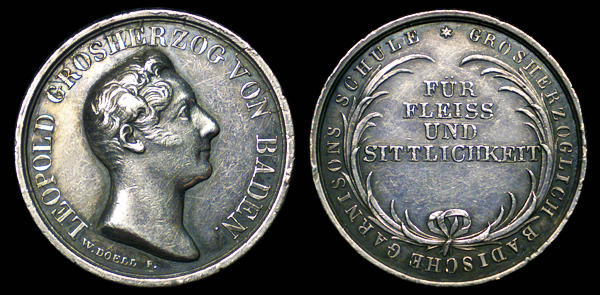
COMMEMORATIVE MEDAL / GRAND DUCAL GARRISON SCHOOL - BADEN - KARL LEOPOLD FRIEDRICH
Date: A.D. 1830 - 1852
Obverse: Portrait head right - LEOPOLD GROSHERZOG VON BADEN - W. Doell
Reverse: Text inside wreath with star above - GROSHERZOGLICH BADISCHE GARNISONS SCHULE - FUR FLEISS UND SITTLICHKEIT
Engraver: Carl Wilhelm Doell
Karl Leopold Friedrich: Grand Duke Leopold von Baden
Leopold's wife Sofia Vilhelmina Katarina Maria Lovisa Charlotta Anna: Princess Sophie of Sweden
Leopold's father Karl Friedrich as a young man. He was Margrave of a unified Baden, later Prince-Elector of Baden as a member state of the Holy Roman Empire and finally first Grand Duke of Baden with the dissolution of the empire in 1806
Leopold's mother Louise Caroline von Hochberg, born Geyer von Geyersberg, from 1787 Baroness von Hochberg, from 1796 Countess of Hochberg |
Silver Commemorative Medal Depicting Karl Leopold Friedrich Grand Duke of Baden. Obverse:LEOPOLD GROSHERZOG VON BADEN (W.DOELL) / Leopold Grand Duke of Baden (Engraver Karl Wilhelm Doell, mint-master at Karlsruhe from 1828 to 1848) Reverse: GROSHERZOGLICH BADISCHE GARNISONS SCHULE - FUR FLEISS UND SITTLICHKEIT / Grand Ducal Garrison School of Baden - For Diligence and Morality. This is an undated commemorative medal / coin for the Grand Ducal Garrison School in Baden. Garrison schools were schools founded for the education of the children of soldiers stationed in or around a certain area.
Baden, as well as most other German states, were a part of the Holy Roman Empire and later the German Confederation, as such they were not fully independent and were unable to act completely independently in cases of succession and passing on of royal titles. With the dissolution of the Holy Roman Empire in 1806, and the assumption of greater sovereignty, Charles Frederick confirmed the dynastic status of the sons of his second marriage, again with the agreement of his three eldest sons, but it was not promulgated. He would eventually include Leopold in the line of succession with proper titles before his death at the age of 82 in 1811. Although Baden had more independence with the collapse of the HRE, the Baden rulers would still have obligations to the German Confederation of which Baden was a member, and they would still need to justify themselves to the other German states before they could include morganatic family members in the Baden line of succession. Karl Friedrich's first son Karl Ludwig passed away at the age of 46 in 1810. His second son Friedrich was removed from the line of succession because he suffered from a "Nerve Fever" that effected him until his death in 1817 at the age of 61. When Karl Friedrich passed away he was succeeded by his 25 year old grandson, the son of the deceased Karl Ludwig, also named Karl Ludwig. Karl Ludwig ruled as Karl I and would continue his grandfathers efforts to legitimize his step uncles from his grandfathers second marriage within the line of succession before he passed away in 1818 at the age of 32 with no surviving male heirs. The proclamations of his grandfather concerning Baden's succession were not without challenges. Bavaria and Austria challenged the succession and the Congress of Vienna recognized their claims on parts of Baden in 1815 so concessions were made shortly before his death. He would be succeeded by his uncle Ludwig I, the third son Karl Friedrich. Ludwig never married and while he is reported to have had several illegitimate children with an actress Katharina Werner, he had no legitimate children and was succeeded by his half brother Leopold. To help further improve the status and claims of Leopold to inherit the titles of Baden, Ludwig arranged for him to marry his great-niece, Sophie, daughter of King Gustavus Adolphus (Gustav IV Adolf) of Sweden and the sister of Grand Duke Karl's sister, Frederica. Sophie was a granddaughter of Leopold's oldest half-brother, Charles Louis, so this marriage united the descendants of his father's two wives. He hoped Sophie's royal pedigree might help to offset the stigma of Leopold's morganatic birth. In 1819, soon after the death of Karl Friedrich, Austria, France, Prussia, Russia, Great Britain, Bavaria and Baden approved the Treaty of Frankfurt which officially recognized the succession of Karl Friedrich's morganatic line (the Hochbergs) and with the death of Ludwig I in 1830, Leopold succeeded him and became the fourth Grand Duke of Baden at the age of 39. As a young man Leopold was educated in political science at the University of Heidelberg, traveled extensively, was a patron of the arts and promoted agricultural reform. He spent his summer months in Baden-Baden where he helped to transform and modernize the small spa town which would serve as his summer residence during his reign. From the beginning Leopold showed liberal tendencies. His father Karl Friedrich had also been open to more liberal policy and reform as in 1818 he granted what was seen at the time to be a liberal constitution and formed a bicameral legislature which he saw as necessary for enacting laws and taxation. At this time, many in Baden were influenced by French revolutionary ideas and this new government was heavily influenced by the French Revolutionary National Convention. Under the tenure of the unpopular Ludwig I there was growing public unrest and clashes between the conservative government and the more liberal Chambers leading Ludwig to dissolve them by decree in 1823 and levy taxes by his own authority. The populist reformers of Baden had good reason to be hopeful with the ascension of Leopold in 1830. He appointed a new cabinet with progressive-thinking members, called for free and unrestricted elections to the legislative chambers and on Christmas of 1831 he issued a liberal press law which outlawed censorship, something unprecedented in the German States at that time. While the members of the new legislature were not all liberal reformers, they were certainly favorable to taking concessionary measures to maintain order. His early reign saw the introduction of liberal reforms to the constitution, criminal and civil law, and education. Industrial development and transport also progressed rapidly under his government with the development of a robust railway network and increased commercial navigation on the Rhine. Leopold supported growth in industry and trade by joining the German Customs Union in 1835. The growth of industry created many new jobs as well as an ever growing income differential between the wealthy bourgeoisie and the working class. The state of affairs in Baden did not escape the notice of the German Confederation of which Baden was a member, especially Austria and Prussia, who pressured Leopold to reascend the press law and some of his liberal reforms which he did in 1832. In another blow to the liberal reformers he appointed the Conservative Friedrich von Blittersdorff to the head of government in 1835 whose policies were seen as an abrupt about face when compared to his cautiously reformist predecessor Ludwig Georg Winter. These reversals contributed to renewed tensions between the liberal chamber and the more moderate bureaucracy. In an attempt at appeasement Leopold appointed the moderate Liberal Minister Johann Bekk in 1846 but this did not stem the ever more radical factions calling for comprehensive change. The issue was less conservative vs liberal as much as moderate liberal vs radical liberal. There was increased divisions between radical democrats led by men like Friedrich Hecker, Gustav Struve and Lorenz Brentano, and moderate liberals like Friedrich Bassermann and Karl Mathy. These growing disagreements, news of the Paris revolution, along with fiery rhetoric, stoked the flames of civil unrest. By 1848 The radical Friedrich Heckler called for rebellion but found few volunteers and those he found were quickly defeated by Baden forces near Kandern. Although the fighting was brief, commanding General of Baden forces Friedrich Balduin von Gagern was fatally wounded in this conflict . Defeated and a wanted man, Heckler fled to Switzerland and later emigrated to the United States. Later that year Gustav Struve sought to lead a revolutionary uprising but received even less support and Leopold's forces were able to quickly put an end to it. In May of 1849, unfavorable military reform caused a revolt within the ranks of the soldiers. Baden regulars, free corps, civic guards and volunteers joined with liberals, democrats and republicans creating a force of around 25,000 men. With the Baden Revolt, Leopold's position had clearly become untenable leading him and his family to flee to Koblenz on May 13, 1849. Leopold moved in with the Prussian Prince Wilhelm (later to be King of Prussia and German Emperor) who had already crushed a revolt in Berlin. Prince Wilhelm commanded the Prussian forces, numbering roughly 70,000 soldiers, who invaded Baden, defeated the revolutionary forces and occupied the Grand Duchy. After the suppression of the uprising, Leopold returned to Karlsruhe on August 18, 1849 and was welcomed by the moderates and conservatives who had not joined the revolutionaries. After the revolution, and under occupation by Prussian forces, his new government was heavily influenced by Prussia and considerably more conservative. Prussians and Loyalists sought retribution leading to the arrest of 14,000 revolutionaries and military trials which resulted in 51 death sentences and 846 sentences of 10 to 15 years imprisonment. The army of Baden was dissolved, reformed and retrained by Prussia before they ended their occupation of Baden. Leopold was already suffering health problems before the revolution and those problems only worsened during and after the revolution leading him to pass the administration of government to his second son Frederick Wilhelm Ludwig on February 21, 1852. His eldest son Ludwig II was technically Leopold's successor but he suffered from mental illness so Friedrich Wilhelm acted as regent. Grand Duke Leopold passed away on April 24, 1852. Although he was a prince who was favorable to making concessions to the growing liberal movement within his domains, Baden ultimately fell victim to radicalism that rather quickly turned into a revolutionary movement. As is so often the case in human history, when radical begins to appear in front of a political ideology (radical left, radical right), the results are always extremism which seldom brings about favorable results. In the end the conflict arose not between liberal and conservative as much as moderate and radical reformers. The radical element sought fundamental change at a quick pace and at any cost leading to violent upheaval and eliciting heavy backlash at the cost of many lives. In the end Leopold was unable to temper the liberal movement within his domains which he help foster and, after losing complete control, essentially abandoned liberal reform as one would a failed experiment. While he brought liberal reform and modernization to Baden, in governance his indecisiveness often led him to be manipulated by ministers in internal matters and self preservation ultimately required him to conform to the obligations and expectations of the much more powerful princes within the German Confederation. In Karlsruhe, the Leopoldstrasse (Leopold Street), the Leopold School and The Grand Duke Leopold Memorial are named for him. In 1833 the Leopoldshafen district (previously Schrock) was renamed in his honor. In 1836 Leopold made a collection of paintings from the Grand Ducal House accessible to the public, for which the Kunsthalle, designed by Heinrich Hübsch, was built. He also was responsible for beginning the reconstruction of the court theater which was destroyed by fire in 1847.
|

